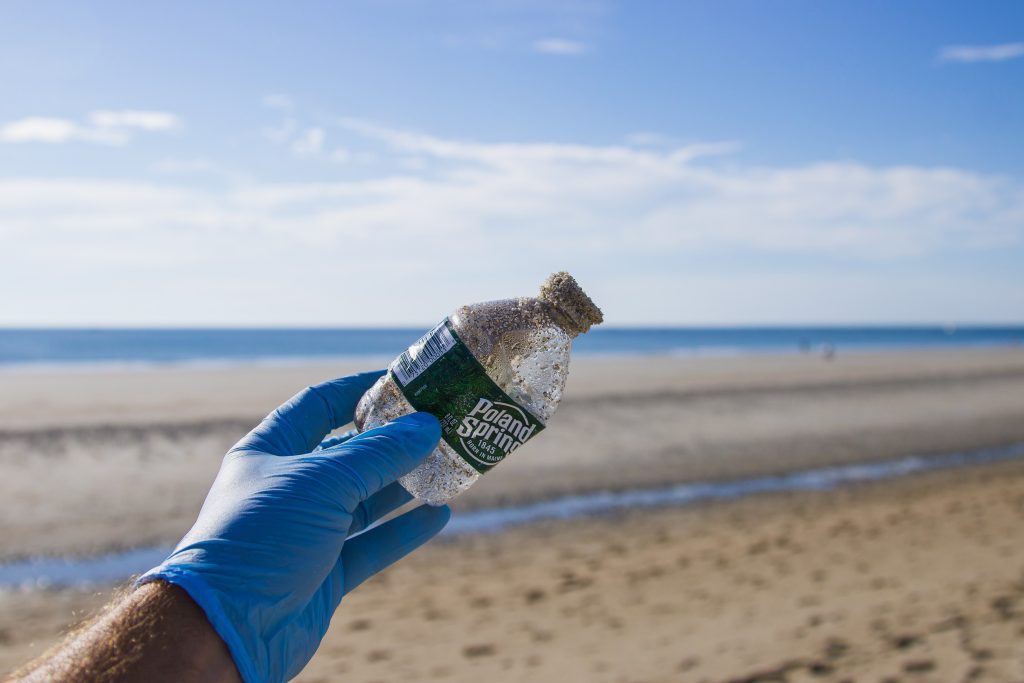
February 15, 2023 By Carol Britton Meyer
Town Meeting will have the final say on whether to approve two single-use plastic water bottle ban by-laws at the April 24 Town Meeting that are being proposed due to serious long-term environmental impacts, including in part that many of these non-biodegradable bottles are discarded in landfills or find their way into the ocean — harming marine ecosystems — rather than being recycled.
Both warrant articles, which the Select Board unanimously supported last night, will be inserted into the Town Meeting warrant at the request of Cleaner Greener Hingham.
Town Meeting 2019 approved banning single-use plastic bags, so passage of these 2023 articles would be a huge step forward in terms of reducing plastic waste in the community, proponents say.
One warrant article, if approved, would prohibit the sale of non-carbonated, unflavored drinking water in single-use plastic bottles of less than one gallon in retail establishments in the Town of Hingham.
The other, if successful at Town Meeting, would make it unlawful for the town — including the schools and the Recreation Department — to procure, sell, or distribute non-carbonated, unflavored drinking water in single-use plastic bottles of less than one gallon. Both bans, if passed, would take effect Jan. 1, 2024.
“We’re chipping away [at this issue] and taking small, manageable steps to get people to change their behavior,” CGH Chair Maria Zade told the Select Board. “Alternatives are readily available.” These include reusable water bottles and water packaged in paper containers that are recyclable, contingent on finding a way to recycle them in Hingham.
In conjunction with this proposed ban, the Weir River Water System has plans to install hydration stations at the Rec Center and another in the downtown area and hopefully more down the road.
“We have a responsibility as a coastal community to guard our seashore,” Zade said. “Many plastic bottles end up in the ocean.”
In addition, such bans align with the town’s net zero goal of reducing carbon emissions across town as quickly as possible, she noted.
CGH members have already talked with downtown businesses to gauge their response.
While a large percentage of business owners said they would not be able to recoup revenue from alternatives, a similar amount said they expected that they would be able to partially recoup revenue from the sale of alternatives rather than the smaller single-use plastic water bottles.
Slightly more than half of the business owners surveyed said they fully support the proposed by-law or are not sure but are inclined to support it. The other half either did not support the ban or weren’t sure but were inclined to not support it.
On the other hand, Select Board Chair William Ramsey said there’s “a lot of enthusiasm about this article. There would be some growing pains, but it would be good to see fewer plastic water bottles in the landfill.”
Select Board member Liz Klein noted that the board has received 62 emails in support of the ban so far. “We do need to address this plastic pollution,” she said. Good communication and education about the proposed warrant articles is key, the board agreed.
“From my own experience, doing the right think is not necessarily costless or painless, but something has to be done,” fellow Select Board member Joseph Fisher said.
It was noted that if the articles pass, it wouldn’t be possible to stop someone from buying bottled water in a neighboring town where there is no ban or coaches of private teams handing it out at sporting events.
However, if the municipal ban is approved at Town Meeting, coaches of school teams would not be allowed to distribute bottled water to team members.
That said, the overall goal would be to encourage as many people as possible to voluntarily give up single-use plastic bottle use of less than a gallon.
There are still many unanswered questions, especially on the municipal ban side, but the Select Board felt a lack of support on their end would not be well-received in light of their support of the retail ban.
Some members of the audience spoke against the ban, saying it wasn’t the right time or that prohibiting retail stores from selling water in plastic bottles would encourage children and others to purchase other, less-healthy drinks in plastic containers.
“I’m for the article in principle, but not enough socialization [about the issue] has been going on,” Andy Ayer said. “I recommend creating a road map first, [rather than the proposed by-laws].
[Implementing such by-laws] wouldn’t make a dent. People could go to Cohasset or Weymouth to purchase bottled water. I hate plastic, but the reality is this is not the right time — maybe in two years as more of the community gets onboard.”
CGH member Tony George, who spoke with a number of retail business owners about the ban, said that he found a large number of them to be “understanding of where we are coming from.”
He further noted that “water is readily available from our taps at home. It’s just a matter of education — changing our habits. We grew up without plastic water bottles, and it’s time now to get back to living without them.”
CGH Elliott Place spoke in favor of the warrant articles. “This is a baby step, yes, but we are going to have to take many of these steps to change our way of life to reach the carbon net zero goal. It will be a sea change.”

